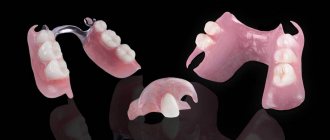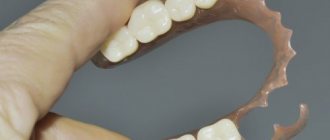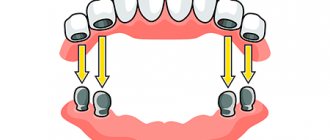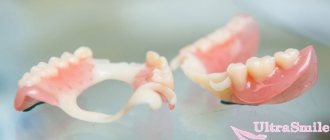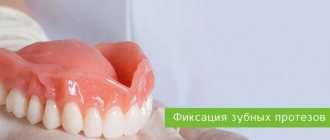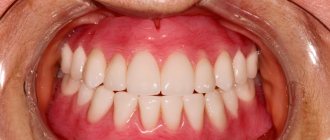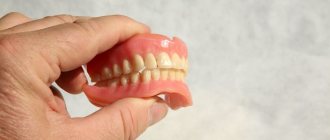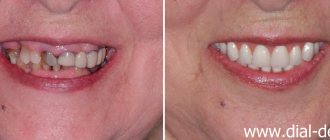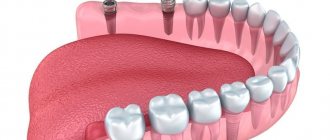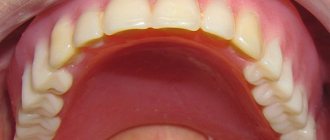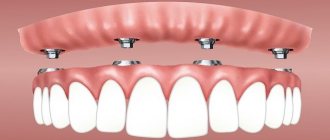11/17/2015 Dentistry 24 Clinic is a professional dentistry that provides a full range of services in the field of prosthetics. Advanced equipment, a staff of qualified doctors with impressive practice, the use of exclusively proven methods, and at the same time maintaining the cost of our services at an affordable level - these are the main advantages of our clinic. You can get acquainted with the services and costs in the section > prosthetics.
Dental structures, the installation of which helps restore the physiological abilities of the dental system, in particular chewing function, and return the patient to an attractive appearance, are called dentures. There are several different classifications of such dental structures, the main ones being removable dentures and fixed ones.
FEATURES OF USING DIFFERENT TYPES OF PROSTHETICS
Removable dentures are designed for self-insertion into the oral cavity and easy removal. Today, modern dentistry offers its patients structures made from various materials and a wide variety of shapes. The main disadvantage is the need to regularly remove the prosthesis for oral hygiene procedures and clean the prosthesis itself. True, for some patients this factor is rather an advantage.
Removable dentures are usually used to restore the physiology of the jaw system in case of partial lack of teeth, complete loss of dentition, or as a replacement for one chewing tooth. True, removable dentures cannot fully compensate for the work of lost teeth, since if they are installed, the chewing load will still fall not on the denture itself, but on the gums. However, this does not have any effect on the condition of the dental system. Especially if you consider that only microprosthetics and crowns can be considered truly physiological prostheses. After all, it is in this case that the load will first fall on the tooth root, and only after that on the bone.
Fixed dentures are installed for a long period of time, and the patient will not be able to remove them independently. The main advantages of this type of prosthetics are the high aesthetic characteristics of this design and their most natural application. After all, after their installation, the patient almost completely stops thinking about his smile, forgetting that he was once worried about this problem. And to avoid problems, it is enough to regularly observe oral hygiene and slightly limit the load on the prosthesis.
True, fixed dental prosthetics has a lot of different contraindications in comparison with removable dentures. That is why their installation has quite a few indications.
What dentures are the best and most comfortable?
Each prosthetic structure has specific characteristics that determine its scope of application.
For upper teeth
The incisors and canines experience less stress compared to the chewing teeth, and they are also within sight. For their prosthetics, the optimal types of fixed prostheses are crowns, adhesive bridges made of zirconium dioxide, glass-ceramics, and metal-ceramics. Molars and premolars are practically invisible, so it is advisable to install durable, inexpensive metal or combined dentures instead. For minor defects, veneers and lumineers are placed in front, and inlays are placed in the back.
Crowns on front teeth
For the bottom
The lower front teeth, like the upper ones, are also located in the smile zone, so fixed structures for them should be as aesthetic as possible. You can save a little on unobtrusive chewing dental units, so the recommendations are the same as in the previous paragraph.
With partial absence of teeth
In such cases, single defects are corrected with cantilever or adhesive bridges. You can also install immediate dentures during a two-stage implantation process. Severe edentia requires the installation of high-quality clasp dentures; you can also try a removable sandwich.
With complete edentia
Most often, inexpensive plate structures are used, but they deform the gums, do not hold well, and cause discomfort. The optimal solution in this case is complete dental implantation.
For temporary prosthetics
In such cases, immediate prostheses are usually used. Cantilever structures can also be used as non-permanent ones.
For children
Which dental prosthetics will be best for a child depends on the specific situation. Typically, children need butterfly dentures during the period of changing teeth to correct the dentition.
| Problem | Suitable prosthesis | Min. price, rub. |
| Upper and lower jaw: Minor, single defects of the anterior and posterior teeth | Ceramic veneers, lumineers | 8000-30000 |
| Zirconium crowns, 1 pc. | 30000 | |
| Metal-ceramic crowns, 1 pc. | 10000 | |
| Metal crowns, 1 pc. | 5000 | |
| Metal-ceramic bridge, 3 units. | 36000 | |
| Glass-ceramic bridge, 3 units. | 72000 | |
| Partial edentia | Adhesive bridge | 13000 |
| Cantilever bridge | 18000 | |
| Clasp prosthesis | 35000 | |
| Completely edentulous | All-on-4 | 400000 |
| All-on-6 | 500000 | |
| Temporary prosthesis | Metal-ceramic crown | 10000 |
| Changing teeth in children | Immediate prosthesis | 3000 |
TYPES OF REMOVABLE DENTURES, PROS AND CONS OF EACH TYPE
There are different types of dentures. However, most often patients are offered three types:
- clasp dentures
- nylon
- acrylic (plate type)
Their main difference lies in the materials used to create the dental structure. However, when choosing the right type of prosthetics, not only the patient’s wishes are taken into account, but also the number of teeth remaining in the oral cavity. The financial capabilities of the patient are also an important factor. But in any case, the cost of removable dentures is an order of magnitude lower than that of structures used for fixed prosthetics. So let’s further get acquainted with what types of dentures are, assessing the pros and cons of each of them.
Adjustment period
After the procedure for installing dentures, the specialist gives the patient certain recommendations to reduce the time of getting used to them. This is a very individual moment, because some people get used to it in a couple of months, while others may need at least one year.
Even if you choose from the best removable appliances, you need to understand that they are all a foreign object in your mouth, so it is natural that some adaptation is required to get used to it. Sometimes it comes to the point that some patients try to get rid of these structures on their own, which cannot be done (especially in the case of conditionally removable dentures).
BUGEL PROSTHETICS
Clasp dentures have a metal base onto which the dentist attaches plastic gums and ceramic crowns. The basis of the prosthesis is represented by a metal arch or clasp, firmly connecting all the elements of the dental structure.
For clasp prosthetics, it is mandatory to have teeth in the oral cavity to which the prosthesis will be attached using hooks. If there are no natural natural teeth that will serve as support, then the installation of implants will be required.
ADVANTAGES OF BUGEL PROSTHETICS:
- The main advantage is the affordable price, compared to the cost of other removable structures. Thus, the lowest price for clasp dentures is about 11 thousand rubles, while the most expensive design will cost the patient 60-70 thousand.
- Improving the techniques of their installation makes it possible to make overlay dentures without a palate not only aesthetically attractive, but also as convenient as possible to use.
- A wide range of uses allows you to install clasp dentures even with dental defects, in the absence of front or lateral teeth, and in the presence of inflammatory gum disease.
- Possibility of choosing fastenings depending on financial capabilities and structural features of the dentition.
- Service life is five years or more.
- They do not need to be removed frequently.
What recommendations should you follow?
If you experience discomfort and pain after installing a prosthesis, you need to contact the specialist who performed this procedure. It is important to follow these tips:
- If you begin to experience discomfort immediately after installation, then you need to wait at least five hours before contacting a specialist again. This is necessary to accurately determine the areas where pain occurs.
- There is no need to try to fix something yourself, redo the design, etc. Your actions will lead to deformation of the new prosthesis and make its further use impossible.
- If ulcers or severe inflammation appear on the mucous membrane, then you don’t have to wait 5 hours and immediately seek help. Do not use any healing creams or other products that can reduce inflammation, but then the picture of the condition will be inaccurate. This will interfere with the proper treatment.
ADVANTAGES OF NYLON PROSTHESES:
- The main advantage of a nylon prosthesis is the possibility of use in patients prone to allergic reactions to metals.
- A special method of fastening allows you to do without grinding the supporting teeth.
- Plastic hooks, unlike metal parts, are invisible during a conversation. And more reliable fixation is ensured by using special creams and gels.
- Nylon dentures can be used in the absence of either one tooth or the entire dentition, as well as in case of dental defects and in the presence of an inflammatory process in the gum area.
- No irritation on the gums due to the use of soft plastic.
- Robust construction with such high elasticity.
- Possibility to choose the color of the prosthesis to match the color of natural teeth.
- The service life of prostheses is about 5-7 years.
Care of fixed structures
Fixed dentures need to be cared for in the same way as real teeth. In order for them to serve to the maximum without losing their aesthetic qualities, it is necessary to carry out a number of measures:
- give up bad habits and products that can damage dentures;
- protect prostheses from mechanical damage (install mouthguards in case of pathological grinding, as well as when playing sports);
- limit the consumption of coloring products to avoid discoloration of dentures;
- Attend routine dental appointments.
Disadvantages of nylon prosthetics:
- Incorrect distribution of load during the process of chewing food. Risk of developing atrophy of the alveolar process of the jaw.
- Poor chewing of food with a high degree of hardness.
- Regular corrections in the dental clinic due to subsidence of the prosthesis.
- Cleaning nylon dentures should be done only with the help of special products.
- The cost of dentures made of nylon is one and a half times higher than clasp dentures (from 15 thousand rubles and more, depending on the number of artificial teeth).
- After installation of a nylon prosthesis, patients are prohibited from drinking strong tea and coffee, as well as eating hot dishes and foods with high acidity.
Orthopedic inlays In-lay, On-lay, Over-lay
In case of minor damage to the chewing teeth, in order to maximize the preservation of the tissues of the natural teeth, not full crowns, but inlays are installed. This procedure also belongs to the group of services for dental prosthetics with fixed dentures, but is more often called microprosthetics and is used when a tooth is destroyed by 25-65%. Essentially, these are fillings made with great precision and durability.
Ceramic inlays have optimal physical and aesthetic properties. First, the inlay is modeled from wax, its color and manufacturing technology are selected, then the inlay is cast according to the wax model. Next comes its fitting, turning, fixing and polishing. Dental orthopedic inlays are fixed in the cavity using special glue. According to the manufacturing ideology, they resemble veneers; in fact, these are a kind of “veneers” for chewing teeth.
One of the modern and patient-friendly technologies in the manufacture of ceramic crowns, inlays and veneers is the CEREC technology. Chairside Economical Restorations of Esthetic Ceramic - economical restoration with aesthetic ceramics at the patient's chair. Directly in the dentist’s chair, a digital impression of the patient’s teeth is taken, the scan is processed, the crown is modeled, and it is manufactured. The whole process takes about three hours.
Disadvantages of acrylic removable prosthetics:
- Dentures are made of hard plastics, which during use can lead to pain due to rubbing of the gums and the formation of wounds.
- Installation of an acrylic denture can lead to partial loss of taste due to the plate completely covering the palate, where a huge number of taste buds are located.
- Impaired diction, as well as the appearance of nausea and vomiting with an increased gag reflex.
- Regular preventive examinations at the dentist for correction.
- Due to its low strength, such dentures are not suitable for chewing food of a high degree of hardness.
- To ensure reliable fixation, it may be necessary to prepare healthy teeth and cover them with metal crowns.
- Acrylic dentures contain a monomer, which in some cases can cause a burning sensation and the onset of an inflammatory process in the oral cavity.
So, which dentures are best in your case can only be determined by a highly qualified doctor, who will take into account all the indications and contraindications for installing a particular type of structure, as well as all the structural features of his patient’s dentition. And only in this case will it be possible to get the desired smile without flaws and defects, as well as the ability to eat food painlessly.
Types of fixed microprostheses
Fixed orthopedic structures also include:
- Dental inlays. These are microprostheses that are glued into the tooth and help restore its anatomical shape. They are used when a large part of the natural dental crown is destroyed. They come in composite and ceramic.
- Veneers. Thin aesthetic overlays for teeth that improve their appearance. Made from composite materials or ceramics.
- Lumineers. The thinnest porcelain plates patented by an American company. They are made only in a dental laboratory located in the USA.
Fixed dentures are convenient because they do not require an adaptation period, do not rub the gums, look natural, and last a long time. Therefore, whenever possible, dentists recommend this method of prosthetics to patients to restore the beauty of a smile, chewing ability and diction, impaired due to the loss of teeth.
